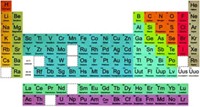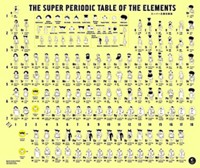Advertisement
Grab your lab coat. Let's get started
Welcome!
Welcome!
Create an account below to get 6 C&EN articles per month, receive newsletters and more - all free.
It seems this is your first time logging in online. Please enter the following information to continue.
As an ACS member you automatically get access to this site. All we need is few more details to create your reading experience.
Not you? Sign in with a different account.
Not you? Sign in with a different account.
ERROR 1
ERROR 1
ERROR 2
ERROR 2
ERROR 2
ERROR 2
ERROR 2
Password and Confirm password must match.
If you have an ACS member number, please enter it here so we can link this account to your membership. (optional)
ERROR 2
ACS values your privacy. By submitting your information, you are gaining access to C&EN and subscribing to our weekly newsletter. We use the information you provide to make your reading experience better, and we will never sell your data to third party members.
Synthesis
Quotable Science
by Stephen K. Ritter
August 22, 2005
| A version of this story appeared in
Volume 83, Issue 34
The language of science and the words of scientists aren't widely aired in public. The diversity of science also means that scientists in one field often don't hear what scientists in another field have said. A new resource that should help spread the language of science across those boundaries is the "Oxford Dictionary of Scientific Quotations."
This compilation includes quotes of scientists from the ancient Greeks to Arab scholars of the Middle Ages to modern times. It also includes substantive commentary about science by politicians, poets, novelists, theologians, and others. In total, the quotes provide a big picture of the thinking behind the discoveries and the social and cultural impacts of science.
The concept for the book developed from the observation that most compilations of quotations are generally lacking in quotes about science. William F. Bynum and Roy Porter, considered two of the U.K.'s best known historians of science and medicine, worked over 15 years to assemble and edit the collection. The quotes are accompanied by author descriptions and the source of the quote, and the selections are indexed and cross-referenced.
As with nearly any book, the Oxford dictionary has some shortcomings. A few of the quotes are undecipherable, while others are merely duds; they should not have been included. The editors also tend to favor the quotes of their British countrymen above those from the rest of the world.
Nonetheless, the book certainly would be a useful reference on anyone's bookshelf. Simply flipping through the pages from time to time might generate a welcome spark of creative thinking.
A sampling of the shorter quotes in the book, selected mostly from those by chemists, follows:
"The same ideas, one must believe, recur in men's minds not once or twice but again and again."--Aristotle
"I try to identify myself with the atoms ... I ask what I would do if I were a carbon atom or a sodium atom."--Linus Pauling
"I have little patience with scientists who take a board of wood, look for its thinnest part, and drill a great number of holes where drilling is easy."--Albert Einstein
"We believe the substance we have extracted from pitch-blende contains a metal not yet observed, related to bismuth by its analytical properties. If the existence of this new metal is confirmed, we propose to call it polonium, from the name of the original country of one of us."--Marie Curie
"God in his wisdom made the fly, and then forgot to tell us why."--Ogden Nash
"A conceptual scheme is never discarded merely because of a few stubborn facts with which it cannot be reconciled; a conceptual scheme is either modified or replaced by a better one, never abandoned with nothing left to take its place."--James Bryant Conant
"Chlorine is a poisonous gas. In case I should fall over unconscious in the following demonstration involving chlorine, please pick me up and carry me into the open air. Should this happen, the lecture for the day will be concluded."--Egon Wiberg
"The unique challenge which chemical synthesis provides for the creative imagination and the skilled hand ensures that it will endure as long as men write books, paint pictures, and fashion things which are beautiful, or practical, or both."--Robert Burns Woodward





Join the conversation
Contact the reporter
Submit a Letter to the Editor for publication
Engage with us on Twitter